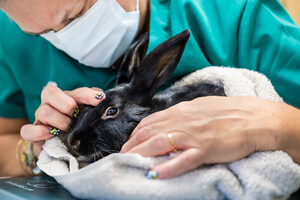
Georgia House Rabbit Society Calls on Petland to End Rabbit Sales
Kennesaw nonprofit joins national coalition led by The Rabbit.org Foundation, citing repeated cases of neglect and suffering among pet-store rabbits
KENNESAW, Ga., Oct. 28, 2025 /PRNewswire/ -- The Georgia House Rabbit Society (GHRS) is calling on Petland to end the sale of live rabbits, joining a national coalition led by The Rabbit.org Foundation. Advocates say Petland's continued sale of baby rabbits—often to inexperienced buyers—has fueled a cycle of neglect and abandonment across Georgia and beyond.
"Across Georgia's three Petland locations, we see the fallout firsthand," said Courtney Gurley, Shelter Manager of GHRS. "Young rabbits are often sent home with families who don't yet understand their specialized needs. Weeks later, many of those same rabbits arrive at our rescue underweight, frightened, and in need of veterinary care."
GHRS, a Kennesaw-based nonprofit that has rescued and rehomed thousands of rabbits since 1996, reports that many of its intakes trace back to retail pet stores. Volunteers handle everything from medical stabilization and spay/neuter surgeries to public education and adoption placement.
"These rabbits are coming in far too young, without access to hay or proper nutrition, and with owners who were never told they need annual veterinary care just like a dog or cat," Gurley said. "It's heartbreaking and preventable."
A Case That Shook the Shelter
One of the most severe cases GHRS handled came in 2020, when a Petland employee brought in a lethargic young rabbit named Lazarus. The worker had found him covered in feces and barely responsive. Shelter staff discovered he was suffering from coccidia, a common parasitic infection, and severely underweight—barely half the normal size for his age.
"Lazarus was in critical condition when he arrived," said Gurley. "It took days of round-the-clock feeding before we saw a glimmer of recovery. By the end of the week, he was hopping, eating hay, and gaining weight. It was an incredible turnaround—but one that should never have been necessary."
Lazarus survived and was adopted a few months later. His story has become a symbol of the resilience of rabbits—and of an industry that treats them as disposable merchandise.
A National Pattern
Paige K. Parsons, founder of The Rabbit.org Foundation and organizer of the national Stop Rabbit Sales Coalition, said Lazarus's story reflects a pattern rescues see across the U.S.
"Every region has its version of Lazarus," Parsons said. "Petland's business model depends on selling under-aged, under-socialized animals to unprepared buyers. Local rescues like GHRS end up footing the bill—in time, compassion, and veterinary costs—to save the ones who make it out alive."
The Stop Rabbit Sales Coalition represents more than 100 rescues nationwide. Members warn that retail rabbit sales contribute to shelter overcrowding and preventable suffering. The group urges Petland to adopt the model already embraced by Petco and PetSmart, which host adoption events with rescues instead of selling animals outright.
"Ending live-animal sales isn't anti-business—it's pro-responsibility," Parsons said. "Petland could choose to lead instead of lag behind public expectations for humane retail practices."
Rescue and Education Hand in Hand
Alongside rescue work, GHRS offers grooming and education programs to help prevent surrender. Staff and volunteers meet local rabbit owners, share information about diet and housing, and connect families with rabbit-savvy veterinarians.
"Our grooming clients often tell us they bought their rabbit from a pet store without realizing how complex their care is," Gurley said. "Education can turn that around—but we'd rather see stores stop creating the problem in the first place."
A Call for Change
Petland operates nearly 90 franchise stores across more than a dozen states, including three in Georgia. Despite years of criticism from animal-welfare groups and investigations documenting poor breeding conditions, the company continues to sell rabbits alongside puppies and other small animals.
"Petland has an opportunity to do better," Gurley said. "They could partner with rescues like ours, support adoptions, and help educate the public. Instead, they're perpetuating a system that profits from animals' vulnerability."
The Georgia House Rabbit Society and The Rabbit.org Foundation urge Petland to end rabbit sales nationwide and transition to adoption partnerships. Supporters can sign the coalition petition at change.org/petland-rabbits and learn more at rabbit.org/activism/petland-georgia.
About Georgia House Rabbit Society
Founded in 1996, the Georgia House Rabbit Society is a nonprofit organization dedicated to rescuing, rehabilitating, and rehoming domestic rabbits while educating the public on proper care. They operate an adoption, boarding/grooming, storefront, and education center in Kennesaw and work closely with veterinarians, shelters, and volunteers statewide. Learn more at houserabbitga.com.
About The Rabbit.org Foundation
The Rabbit.org Foundation is a nonprofit dedicated to improving rabbit welfare through education, advocacy, and collaboration with shelters, rescues, and veterinarians.
Media Contact:
Courtney Gurley
Shelter Manager, GHRS
678-982-0349
rabbit.org/activism/petland-georgia
SOURCE Rabbit.org Foundation








Share this article